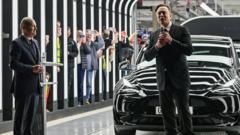In recent weeks, Elon Musk's interventions in European politics have sparked significant backlash from numerous leaders, particularly in Germany. The billionaire, who owns the social media platform X, has publicly ridiculed German Chancellor Olaf Scholz, calling him an "incompetent fool" and calling for his resignation. As Musk prepares to host a discussion with Alice Weidel, the head of Germany's far-right AfD party, this intervention has drawn widespread scrutiny, especially with federal elections looming on February 23.
Chancellor Scholz attempted to downplay Musk's commentary by advising politicians to "stay cool" and "not feed the troll." However, other European leaders are not so dismissive. French President Emmanuel Macron expressed astonishment at Musk's role in amplifying "international reactionary movements" through social media. Norway’s Prime Minister, Jonas Gahr Store, voiced concerns over Musk’s significant involvement in domestic issues of various countries, highlighting the potential dangers of an individual wielding substantial economic and social media power.
Spain's government also weighed in, with spokeswoman Pilar Alegría demanding digital platforms maintain "absolute neutrality" in political matters. In a concerning pattern, Musk has recently highlighted crime statistics in various nations, attributing these to "unchecked immigration," one of his preferred themes.
In the UK, Prime Minister Keir Starmer has pushed back against negative misinformation propagated via Musk's platform, stating that such actions reveal a lack of concern for the victims involved and are instead self-serving.
In contrast, leaders such as Italy's Giorgia Meloni have found common ground with Musk, praising him as a "genius" and enthusiastically welcoming his involvement. Meanwhile, Viktor Orbán of Hungary shares Musk's critique of liberal philanthropist George Soros, showing that support for Musk is not universal among European officials.
Musk’s engagement in German politics is particularly contentious, as German security services classify the AfD as right-wing extremist. Despite Musk defending the AfD and suggesting its portrayal as extremist is inaccurate, politicians across the spectrum have criticized his influence. Robert Habeck of the Greens expressed the sentiment succinctly: "Hands off our democracy, Mr Musk."
Meanwhile, concerns grow over Musk's business dealings in Italy, particularly regarding negotiations for a potential $1.6 billion contract with the government for Starlink services, which some opposition leaders deem troubling given Musk's political stance.
As Musk continues to imprint his influence on the political landscape of Europe, the boundaries of social media’s role in politics will be tested, raising questions about free expression versus foreign interference in democratic processes.
Chancellor Scholz attempted to downplay Musk's commentary by advising politicians to "stay cool" and "not feed the troll." However, other European leaders are not so dismissive. French President Emmanuel Macron expressed astonishment at Musk's role in amplifying "international reactionary movements" through social media. Norway’s Prime Minister, Jonas Gahr Store, voiced concerns over Musk’s significant involvement in domestic issues of various countries, highlighting the potential dangers of an individual wielding substantial economic and social media power.
Spain's government also weighed in, with spokeswoman Pilar Alegría demanding digital platforms maintain "absolute neutrality" in political matters. In a concerning pattern, Musk has recently highlighted crime statistics in various nations, attributing these to "unchecked immigration," one of his preferred themes.
In the UK, Prime Minister Keir Starmer has pushed back against negative misinformation propagated via Musk's platform, stating that such actions reveal a lack of concern for the victims involved and are instead self-serving.
In contrast, leaders such as Italy's Giorgia Meloni have found common ground with Musk, praising him as a "genius" and enthusiastically welcoming his involvement. Meanwhile, Viktor Orbán of Hungary shares Musk's critique of liberal philanthropist George Soros, showing that support for Musk is not universal among European officials.
Musk’s engagement in German politics is particularly contentious, as German security services classify the AfD as right-wing extremist. Despite Musk defending the AfD and suggesting its portrayal as extremist is inaccurate, politicians across the spectrum have criticized his influence. Robert Habeck of the Greens expressed the sentiment succinctly: "Hands off our democracy, Mr Musk."
Meanwhile, concerns grow over Musk's business dealings in Italy, particularly regarding negotiations for a potential $1.6 billion contract with the government for Starlink services, which some opposition leaders deem troubling given Musk's political stance.
As Musk continues to imprint his influence on the political landscape of Europe, the boundaries of social media’s role in politics will be tested, raising questions about free expression versus foreign interference in democratic processes.



















